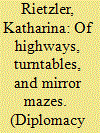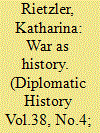|
|
|
Sort Order |
|
|
|
Items / Page
|
|
|
|
|
|
|
| Srl | Item |
| 1 |
ID:
191611


|
|
|
|
|
| Summary/Abstract |
We thank the Cambridge Review of International Affairs for organising this review and Juliette Gout, Rebecca Turkington and Lauren Wilcox for their engagement with Women’s International Thought: A New History. We were fortunate to collaborate with an exceptional interdisciplinary cast of authors to whose intellectual contributions and analyses we remain deeply indebted as they were vital for carrying out this project, and we would like to express our gratitude on their behalf, too. We would also like to acknowledge our indebtedness to the other collaborators on the Leverhulme Trust Research Project on Women and the History of International Thought, of which this edited volume is the first book-length output, namely Kimberly Hutchings, Sarah C. Dunstan, and Joanna Wood.
|
|
|
|
|
|
|
|
|
|
|
|
|
|
|
|
| 2 |
ID:
120425


|
|
|
|
|
| Publication |
2013.
|
| Summary/Abstract |
This exploratory essay reflects on recent scholarship on twentieth-century European-American relations that has used the concept of "Americanisation," particularly with regard to cultural transfers. The essay analyses how concepts of Americanisation have changed over time and uses the historiography of American philanthropy abroad to illustrate these changes. Whilst most scholars who apply the concept now view Americanisation as a two-way process which entails selective adaptation and transformation, there are subtle differences in emphasis. The essay traces these in the use of metaphors. Two metaphors have achieved prominence recently, the highway and the turntable. Testing both against empirical material taken from the transnational history of American foundations, the article then introduces a third metaphor, the mirror maze, which brings out a neglected dimension, the question of reflexivity.
|
|
|
|
|
|
|
|
|
|
|
|
|
|
|
|
| 3 |
ID:
189516


|
|
|
|
|
| Summary/Abstract |
What can the history of the U.S. foreign policy think tank tell us about women’s intellectual history? Historical scholarship has conventionally emphasized women’s marginalization in these locations, and not taken them seriously as potential pathways for women’s international thought. Peter Grose, the official historian of the Council on Foreign Relations (CFR), the United States’ most venerable foreign policy think tank, has explained women’s exclusion from Council membership until the 1960s by pointing to the gender conventions of its founding years. Grose argues that “the prospect of a woman ‘qualified’ for the Council’s fellowship was simply too remote from the experience of the founding members even to be raised.” Robert Schulzinger, author of another authoritative study, has similarly described how opponents to women’s CFR membership invoked stereotypically feminine character traits such as indiscretion and intellectual unreliability, arguments that were also used to bar women from diplomatic posts.1 However, such observations do not take into account that, first, the CFR was unusual in its ring-fencing of an exclusively male discursive space and, second, that women contributed in significant ways to foreign policy thinking even within the CFR. Recent research on other U.S. foreign policy think tanks provides a more nuanced analysis of the think tank as a location, while scholarship on women’s international thought in the academy and wider public culture reveals that women were thinking, speaking, and writing prolifically on international affairs throughout the interwar years.2 In 1929, seven out of nine staff of the Research Department of the Foreign Policy Association (FPA) were women.3 And in 1936, the FPA’s president could joke that he would “serve” as a mere “interlocutor” during a radio program in which four “lady authorities” held forth on international politics.4 The history of the foreign policy think tank can tell us much about women foreign policy intellectuals in a period marked by U.S. ascendancy.
|
|
|
|
|
|
|
|
|
|
|
|
|
|
|
|
| 4 |
ID:
134200


|
|
|
|
|
| Publication |
2014.
|
| Summary/Abstract |
This essay analyses the "history wars" of the interwar years through the lens of the Carnegie-sponsored Economic and Social History of the World War, both as an antidote to "pre-emptive" historiography and as a crucial intervention that reinforced the salience of comparable social and economic data in international political debates.
|
|
|
|
|
|
|
|
|
|
|
|
|
|
|
|
|
|
|
|
|